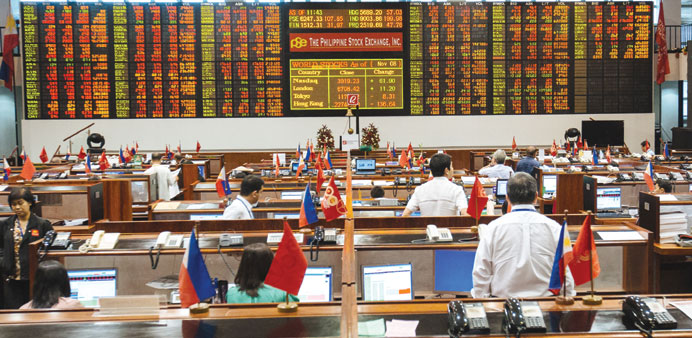Bloomberg
Jakarta
The tide of hot money is turning in favour of Thailand, Indonesia and the Philippines.
Overseas investors have bought a net $1.6bn of shares in the three Southeast Asian countries in March, poised for the biggest monthly inflow since January 2013. That follows $4.2bn of withdrawals in the fourth quarter, which matched the largest outflow since Bloomberg began tracking the data in 1999.
The combination of easing political unrest in Thailand, a shrinking current-account deficit in Indonesia and slowing inflation in the Philippines is convincing foreign investors that the economies are strong enough to weather reduced Federal Reserve stimulus. Equity gauges in the three countries are trading at valuations at least 9% cheaper than their 2013 peaks even after climbing an average 9.2% this year.
“The rapid rise in these markets is merely a catching up from last year’s decline caused by hot-money outflows,” David Ross, a managing director at Chevy Chase Trust in Bethesda, Maryland, which oversees about $17bn, said by e-mail. He predicted further gains in Indonesian and Philippine shares, while saying the rally in Thailand may be near an end.
Indonesia’s central bank estimates the nation’s current-account deficit will narrow to 2.5% of gross domestic product this year from about 3.3% in 2013, while Philippine inflation slowed in February for the first time in six months. Thailand’s government agreed to end a state of emergency in Bangkok yesterday following months of anti-government protests and clashes that killed 23 people.
The Jakarta Composite Index has climbed 13% this year through Friday, while the Philippine Stock Exchange Index gained 9.7%. Thailand’s SET Index added about 5% as tourism-related companies including Central Plaza Hotel and Airports of Thailand rallied. The MSCI Emerging Markets Index has lost 5.2%.
That’s a turnaround from the second half of 2013, when the Fed’s move toward paring its record stimulus programme dragged down the Southeast Asian indexes by at least 8.9%, making them three of the world’s four biggest losers among global equity gauges tracked by Bloomberg.
“TIP markets have shown impressive rebounds recently with the return of foreign funds,” Vana Bulbon, the chief executive officer of UOB Asset Management (Thailand) Co, which oversees about $7.2bn in Bangkok, said in an interview on March 18.
The Jakarta index dropped 1.2% as of 10:45 am Singapore time, while the Philippine measure slipped 0.8%. The MSCI emerging markets index lost 0.9%.
Fed chair Janet Yellen said on Friday that the US central bank may start raising interest rates “around six months” after it stops buying bonds.
The rally is vulnerable to a slowdown in China, according to Samsung Asset Management Co The world’s second-largest economy, which buys at least 9% of overseas shipments from the three Southeast Asian countries, may expand about 7.5% this year, the weakest pace since 1990, according to economists in a Bloomberg survey.
China’s retail sales and industrial production trailed estimates in February, while home prices in some of the country’s largest cities rose last month at the slowest pace since 2012. A closely-held developer collapsed this month while the country suffered its first onshore corporate bond default.
The potential for contagion in China’s financial markets “is my biggest concern right now,” Alan Richardson, whose Samsung Asean Equity Fund outperformed 96% of peers tracked by Bloomberg during the past 12 months, said by phone from Hong Kong.
Stocks in the so-called TIP markets have already gotten cheaper relative to earnings prospects. The SET index is valued at about 12.5 times estimated profits for the next 12 months, down from almost 15 times before the Fed first signaled the possibility of reduced stimulus in May. The Indonesian gauge’s multiple has dropped to 15 from a high of 16, while the Philippine measure’s slipped to 17 from 21.
Foreign investors have bought a net $202mn of Thai equities in March, poised for the first monthly inflow since protests started in Bangkok on October 31. They pulled $3.8bn from the country’s stocks in the four months through February 28 as opposition groups staged demonstrations demanding the resignation of Prime Minister Yingluck Shinawatra.
The Indonesian gauge posted the biggest gain this year after Jakarta Governor Joko Widodo secured his party’s nomination as a presidential candidate, fueling speculation that his administration would boost spending on infrastructure and public welfare if he wins in July. Indonesian shares have lured $1.2bn in March, bringing inflows this year to $2bn.
In the Philippines, consumer-price inflation slowed to 4.1% in February from a two-year high of 4.2% the previous month. The economy expanded at a 6.5% pace in the fourth quarter, the third-fastest rate among Asian countries tracked by Bloomberg.
“I don’t believe we have seen a peak in the Indonesian nor Philippine stock markets,” Chevy Chase’s Ross said. “The hot-money outflows we saw last year really were non-discriminating. The money coming back into markets has some fundamental reason behind it.”

